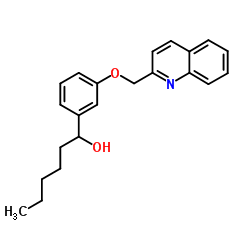Enhanced activity of Ca2+-activated K+ channels by 1-[2-hydroxy-3-propyl-4-[(1H-tetrazol-5-yl)butoxyl]phenyl] ethanone (LY-171883) in neuroendocrine and neuroblastoma cell lines.
Ping-Chia Li, Jin-Tung Liang, Hung-Tu Huang, Pei-Hsuan Lin, Sheng-Nan Wu
Index: J. Cell Physiol. 192(2) , 188-99, (2002)
Full Text: HTML
Abstract
The effects of LY-171883, an orally active leukotriene antagonist, on membrane currents were examined in pituitary GH(3) and in neuroblastoma IMR-32 cells. In GH(3) cells, LY-171883 (1-300 microM) reversibly increased the amplitude of Ca(2+)-activated K(+) current in a concentration-dependent manner with an EC(50) value of 15 microM. In excised inside-out patches recorded from GH(3) cells, the application of LY-171883 into cytosolic face did not modify single channel conductance of large-conductance Ca(2+)-activated K(+) (BK(Ca)) channels; however, it did increase the channel activity. The LY-171883-stimulated activity of BK(Ca) channels is dependent on membrane potential, and results mainly from an increase in mean open time and a decrease in mean closed time. However, REV-5901 (30 microM) suppressed the activity of BK(Ca) channels and MK-571 (30 microM) did not have any effect on it. Under the current-clamp condition, LY-171883 (30 microM) caused membrane hyperpolarization as well as decreased the firing rate of action potentials in GH(3) cells. In neuroblastoma IMR-32 cells, the application of LY-171883 (30 microM) also stimulated BK(Ca) channel activity in a voltage-dependent manner. However, neither clofibrate (30 microM) nor leukotriene D(4) (10 microM) affected the channel activity in IMR-32 cells. Troglitazone (30 microM) decreased the channel activity, but ciglitazone (30 microM) enhanced it. This study clearly demonstrates that LY-171883 stimulates the activity of BK(Ca) channels in a manner unlikely to be linked to its blockade of leukotriene receptors or stimulation of peroxisome proliferator-activated receptors. The stimulatory effects on these channels may, at least in part, contribute to the underlying cellular mechanisms by which LY-171883 affects neuronal or neuroendocrine function.Copyright 2002 Wiley-Liss, Inc.
Related Compounds
| Structure | Name/CAS No. | Molecular Formula | Articles |
|---|---|---|---|
 |
LY 171883
CAS:88107-10-2 |
C16H22N4O3 | |
 |
L-655238
CAS:101910-24-1 |
C22H25NO2 |
|
Role of leukotrienes in N-(3,5-dichlorophenyl)succinimide (N...
2012-10-09 [Toxicology 300(1-2) , 92-9, (2012)] |
|
Effect of leukotriene C4 exposure on ciliated cells of the n...
1996-01-01 [Prostaglandins 51(1) , 69-79, (1996)] |
|
Blood cell-vascular wall interactions and the production of ...
1995-01-01 [Adv. Prostaglandin. Thromboxane. Leukot. Res. 23 , 385-7, (1995)] |
|
The G protein-coupled receptor CysLT1 mediates chemokine-lik...
2012-04-01 [Leuk. Lymphoma 53(4) , 665-73, (2012)] |
|
Furosemide attenuates bronchial responsiveness to antigen ch...
1995-01-01 [Adv. Prostaglandin. Thromboxane. Leukot. Res. 23 , 365-7, (1995)] |